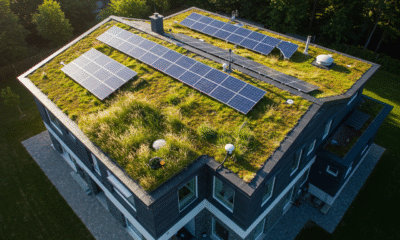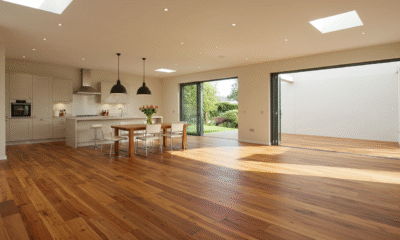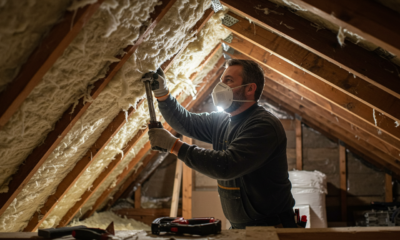

Environment
How to Get Planning Permission for Your Eco Home
In 2022, many people are looking to improve the sustainability of their home to make it more eco-friendly. In this article, we’ll take you through the all-important steps of getting planning permission for your eco home project.
Sustainability is becoming a growing concern for adults throughout the UK. One poll showed 75% of adults in Britain are worried about climate change.
You will need to make some changes to live an eco-friendlier lifestyle. This can involve making green home improvements.
Making your home eco-friendlier can help your wallet as well as the environment but, before going ahead, it’s essential that you know what’s involved and what, if any, permissions you need to obtain before starting.
In some cases, there are restrictive covenants on property you own, meaning you could be extremely limited to what you can do with your property development. In this article, we’ll take you through the steps for gaining planning permission for your eco home.
What are Restrictive Covenants?
Restrictive covenants are rules within your property deeds which tell you what you can and cannot do to the property. Many people are under the mistaken belief that, once they buy a property, they are free to do as they please but, this is not always the case.
In some instances, there may be rules in place to protect the interests of your neighbors and the surrounding area. So, it’s always a good idea to check this in your title deeds and get a solicitor to take a look for you if necessary.
How to Get Planning Permission for Your Eco Home
Gaining planning permission for an eco-building project won’t usually be more complex or difficult than for an ordinary project but, it’s important to first understand two distinctions within this:
- Planning – Planning permission is usually necessary if a homeowner is intending to make a change to the appearance of a property. For example, changing the facade of a house.
- Building control – This kind of permission is applicable when changes are intended to the structure or aspects such as drainage or fire protection.
Knowing which of these is required for your project is the first – and most important step toward your eco home.
Location Depending
In the UK, there are a number of rules which need to be followed depending on where your home is located. For example, if your property is within a conservation area or area of Outstanding Natural Beauty, you may have to follow some strict guidelines in terms of aesthetics.
For example, you may be required to use only natural stone or brick for the exterior of your home and / or adhere to a particular type of finish for your roof. If you take a look at the deeds for your property, you should be able to find information on local area restrictions but, if not, your local council office should be able to help.
Council Sustainability Plan
The good news is that, if your local council has a Sustainability Plan in place, gaining permission for some eco projects for your home may not just be possible but will be positively encouraged.
This will usually include works carried out in vernacular building styles, for example, using environmentally friendly lime mortar rather than cement. In some cases, you may even gain assistance from the council for your project.
Eco Installations
If your property is within a conservation area and you wish to install eco features such as solar panels, external wall insulation or eco glazing, this can be a little more tricky. Take a walk around your local area to find properties which already have these features installed and then speak to the owners to find out how they were able to gain permission to install these.
Making Your Application
Gaining planning permission can often be a long drawn-out process but, by following these steps, you can help to simplify things a little:
- Look up the contact details for your local council planning officer and ask for a copy of the development plans which will guide you as to what is and isn’t allowed. Email the planning officer to ask about any further restrictions which may be in place.
- If you’re on good terms with your neighbors, discuss your plans with them in order to see if they have any objections which may harm your application. Put together details and sketches of your planned project.
- Make an appointment with the planning officer to discuss your project, this will save you time in the long run as they will be able to alert you to any possible problems and let you know what your chances of a successful application are.
- Submit your application and await approval.
How to Find Your Council Planning Officer
You will usually be able to find details of your planning officer on your local council website but, if this is not the case, your local MP will be able to point you in the right direction in terms of who you need to be speaking to about your project. If your MP is an environmentalist, they may just turn out to be an advocate for your eco home project!
Creating Greener Homes…
In 2022, most UK councils are working toward eco goals – including the global 2030 sustainable goals. As such, many will be open to considering projects which aim to make a home eco-friendlier.
For the best chance of your project application being successful, it’s incredibly important to make sure that you know of any rules and restrictions beforehand as failing to do so can result in a lot of time wasted.
As mentioned here, it’s also a good idea to try to get your neighbors onside where possible as, if one or more objects to the plans after submission, there’s a good chance that your application will either be delayed or rejected.
Please be advised that this article is for general informational purposes only, and should not be used as a substitute for advice from a trained legal professional. Be sure to consult a lawyer/solicitor if you’re seeking advice on the conveyancing or project planning. We are not liable for risks or issues associated with using or acting upon the information on this site.


 Environment12 months ago
Environment12 months agoAre Polymer Banknotes: an Eco-Friendly Trend or a Groundswell?

 Features11 months ago
Features11 months agoEco-Friendly Cryptocurrencies: Sustainable Investment Choices

 Features12 months ago
Features12 months agoEco-Friendly Crypto Traders Must Find the Right Exchange

 Energy11 months ago
Energy11 months agoThe Growing Role of Solar Panels in Ireland’s Energy Future




























